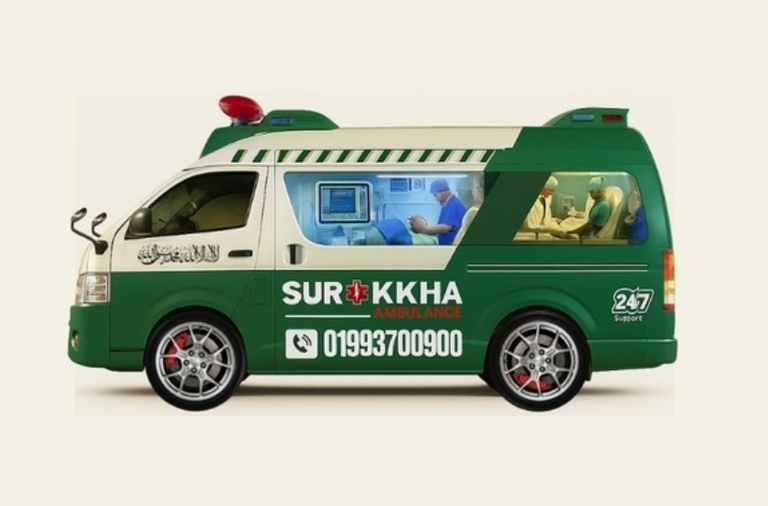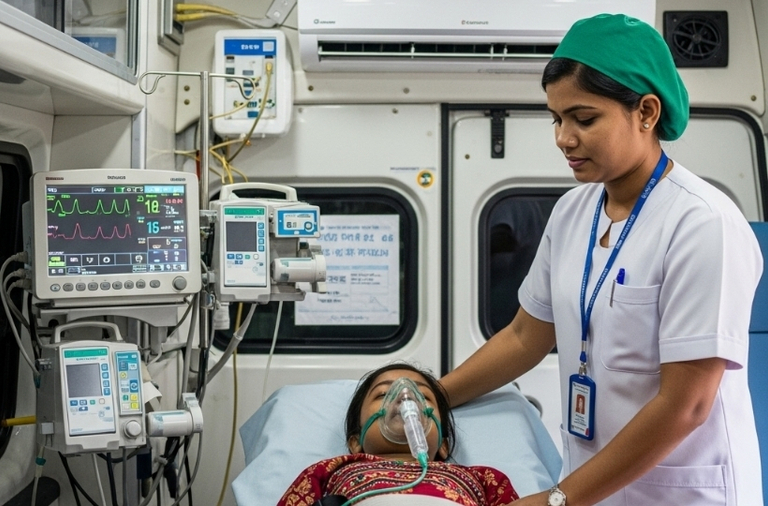Please fill out the form below and we will get back to you as soon as possible.
PICU Ambulance : Pediatric Intensive Care Support During Medical Transport
Pediatric Intensive Care Unit (PICU) Ambulance is intended for pediatric and neonate children as part of advanced life-support care, to children who are critically ill and in need of constant monitoring and acute medical interventions during transportation. These are ambulances with the most advanced types of medical equipment and professionals who specialize in critically ill pediatric patients. PICU ambulances make it possible for children to receive critically high standards of care while en route to hospitals or pediatric specialty facilities.
Some of the Features of PICU Ambulance Service:
Specialized Medical Equipment: PICU Trucks The ambulances in this category have a variety of highly advanced medical technology for the pediatric populations:
Cardiac Monitor: Dynamic Monitoring of heart rate, ECG, blood pressure, SpO2 and other signs more established for kids, able to detect irregularities or emergencies immediately.
Ventilator: Oxygenation for pediatric transport, supporting infants and children who may be having difficulty breathing adequately on their own, maintains ventilation, provides oxygen during transport
.
Oxygen: Infrastructure for availability of oxygen supply systems (cylinders, delivery system) to safeguard the child against oxygen starvation, in particular when in respiratory distress.
Infusion Pumps: Intravenous blood infusions, medications, or nutrients for support of the patient and basic treatments.
Suction Apparatus: Aids in clearing the airways as contaminants such as thick mucus or objectionable products may obstruct over child’s air passages from remaining open.
Pulse Oximeter & Pediatric Monitoring: Monitors your child's vitals such as oxygen levels, heart rate, and respiratory rate, giving doctors the right data to make better decisions.
Temperature Control Device: Keeps the patient at a constant body temperature to avoid hypothermia or hyperthermia.
Skilled Medical Crew: PICU transport ambulances are fully equipped with medical personnel, who are expert in pediatric care:


PICU Nurses: Nurses who are highly specialized in the care of critically ill infants and children. They are skilled at performing advanced medical procedures and delivering ongoing care en route.
Pediatricians or Neonatologists: Specialty physicians who offer professional medical care for critically ill children including all necessary procedures and therapies based on specific child's condition.
Respiratory Therapists: Skilled providers who care for and watch over the child’s breathing, including respiratory distress or failure.
Paramedics: Technosavvy paramedics who deliver basic life support, and support MMU treatments while in transit.
Use Cases for PICU Ambulance: PICU Ambulances are for the transport of children and infants in need of critical medical care such as:
Preemies: Transporting preemie babies needing special care, they need incubators and ore support.
Severe respiratory distress: Such as newborn/infant respiratory distress syndrome (NRDS) or asthma attack and requiring assisted ventilation or oxygen therapy.
Major trauma: Children with major injuries (e.g., fractures head injuries) that require constantly monitoring and intervention during transport. Pediatric Cardiac Emergencies Children with severe cardiac diseases(e.g. congenital heart disease, arrhythmias) requiring specialized cardiac monitoring and interventions. Special Populations The following are the special populations of patients that may be placed in the PHDU
Life-threatening Infections: Infants and children that are critically ill due to a serious infection or sepsis and need urgent medical management including resuscitation.
Post-Op Care: For kids having major surgery who require ongoing care to monitor their vitals, administer medication and aid in their recovery.
Continuous Medical Care During Transit: PICU ambulances offer uninterrupted state-of-the-heart medical care during transport. Throughout the journey, the child's vital signs, oxygenation and hydration levels are monitored, the child is kept stable, and respiratory support, fluids and medications are provided. This level of care is critical for maintaining the child's safety and for having the child ready to be treated immediately on arrival at the hospital.
PICU Vans are often used for interfacility transport; i.e., they carry sick children from one health care facility to another. This generally means transferring children to a pediatric facility that is equipped to deliver more specialized treatments or surgery after staying in a local hospital. Care forward is maintained, meaning the child will be stable for immediate treatment on arrival.
Join us as a media partner
As an Ambulance Media Partner, you will play a pivotal role in spreading awareness about the critical importance of fast, lifesaving emergency care. Your efforts will help ensure that more individuals are informed about how to reach us and understand the rapid response protocols our medics follow when every second counts. Through your collaboration, we will amplify our outreach and educate the public on the vital service we provide in urgent situations.
Join us as an ambulance service partner.
By partnering with us, you will play a critical role in providing essential emergency medical services to the community during times of crisis. Your contribution will enable us to expand our fleet of ambulances and enhance the quality of our care, ensuring that vital medical support reaches all individuals in need, regardless of the circumstances. Your involvement will be instrumental in making a tangible, meaningful impact on public health and safety.
PICU vehicles are designed to deliver life-saving support to children who are seriously ill whilst being transferred in the ambulance. These ambulances have sophisticated medical equipment, trained paediatric care personnel and 24x7 monitoring to help children get the best of treatment while they are moved to healthcare facilities. For emergency transport or transfers between facilities, it is essential to provide a pediatric focus across all aspects of transport care.
Service Equipment
We offer hospital-level care for children outside of the hospital through our PICU (Pediatric Intensive Care Unit) ambulances. Each ambulance is equipped with state-of-the-art technology to monitor continuously, act rapidly and provide full life support for babies and young children. We have pediatric transport ventilator(with CPAP/BiPAP), multi-parameter pediatric monitor(ECG, SpO₂, NIBP, EtCO2). Pediatric defibrillator/AED with child pads, Infusion/syringe pumps and Suction unit. Nebulizer, Warming blankets, Emergency pediatric drug kits with broselow tape and size-based airways. Each device is helping us provide continuous, close care from pickup to handover at the hospital. Supported by a PICU (Pediatric Intensive Care Unit) trained team (Pediatrician, PTIC nurse, and respiratory therapist/paramedic), our non-emergency ambulance service offers secure, specialist transport for severe asthma / bronchiolitis, pneumonia with breathing failure, sepsis or septic shock, Diabetic ketoacidosis (DKA) , status epilepticus major trauma congenital heart disease post-operative transfers and other life-threatening conditions. In essence it is a mobile PICU, capable of stabilizing on scene, providing transport with advanced pediatric treatment and handing over rapidly to the appropriate hospital team.
-
Incubator
-
Cardiac Monitor
-
Portable Ventilator
-
CPAP
-
BiPAP
-
Intravenous Infusion Pump
-
Warmer
-
Pulse Oximeter (Child)
-
Neonatal Oxygen Hood
-
Laryngoscope
-
Brain Circuit
-
Oxygen Cylinder
-
Syringe Pump
-
Patient Monitor
-
Medical Medication cabinet
-
Pulse Oximeter (Adult)
-
Suction Device
-
Thermometer
-
Glucometer
-
Stethoscope
-
Wheel Chair
-
Portable Stretcher
-
Blood Pressure Cuff
-
MT8 Transport Container
-
Thermal Blood Transport Bag
-
Airway
-
Blood Pressure Cuff(Automated)
-
Spinal immobilization devices
-
Trauma kit

